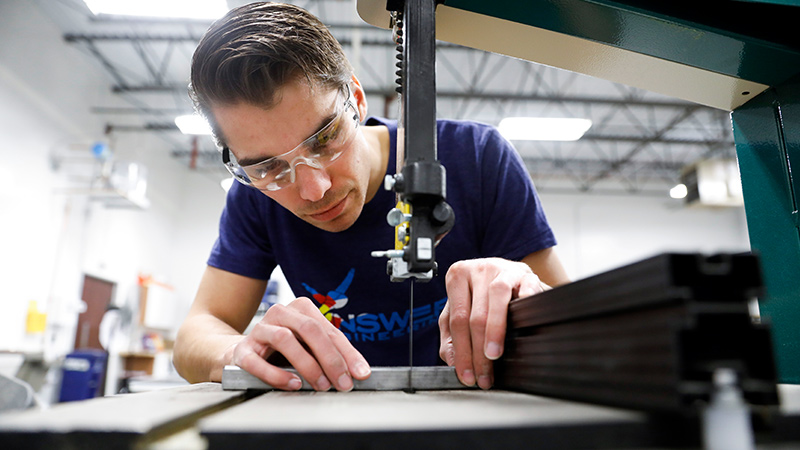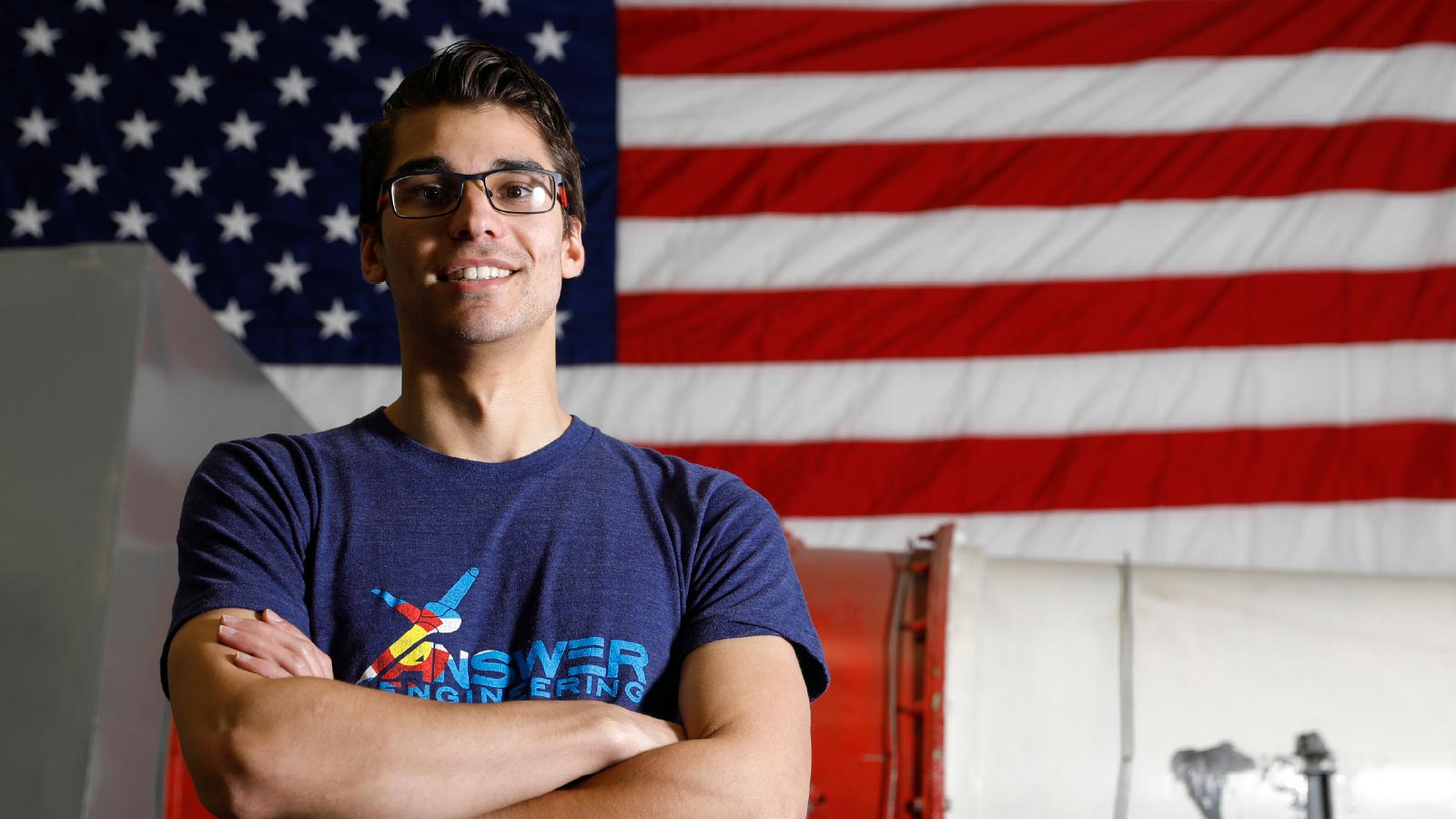Stay Up to Date
Submit your email address to receive the latest industry and Aerospace America news.
Young aerospace professionals' career goals nurtured by love of science
Workforce data suggests that, whether they like it or not, aerospace employers who want to succeed will need to rely on the talents of millennials, the generation of people about 20 to 35 years old who grew up with the internet and are sometimes disparaged as easily bored, prone to job hopping and impatient for promotion.
The average age of an aerospace worker was 46 in Aviation Week’s 2017 Workforce Study. Workers older than 55 outnumbered those under 35. Employers have no choice but to turn toward millennials, and they are starting to do so. In the 2017 Workforce Study, employers planned to target 28 percent of new hires straight out of college. The year before, new grads amounted to 16 percent of new hires.
The good news for employers is that the common view of millennials appears more than ever to be a stereotype, an oversimplification that does not hold up to scrutiny. Like all human beings, millennials are prone to maturing, and at times they even show signs of settling down. Here are some insights about millennials based on the views of some who attended a November discussion about their generation organized by AIAA’s Rocky Mountain section.
Inspiration — and internships — attract college students to the industry
Earlier generations were inspired by the Apollo and space shuttle programs. Millennials sometimes find their passions by circuitous routes.
Magens Orman was an art major at Metropolitan State University of Denver without much direction, and the degree required a science elective.
“I picked the least-miserable-sounding science credit that I could, and that was Intro to Space,” Orman says.
“The professor told me that if I wanted to pass the class, I had to put up a balloonsat, and that it was going to have to record data. And that was horrifying to me because ‘I don’t do science.’
“And we got the thing back, and it took pictures — and it was like getting hit in the face by the universe. It was a moment where my life diverged.”
She graduated in 2014 with a bachelor’s in aerospace systems design and now works as an engineering technician for Sierra Nevada Corp. She loves that her job includes aspects of NASA’s new Mars rover.
“The prospect that this thing is going to another planet, and I built it, is overwhelmingly beautiful to me — that I have the opportunity to expand human reach for the species, for the planet. … And that may be a little bit of an ego trip, but it drives me, and I think it’s wonderful.”
For Chris Pumford it was a sorority sister at Colorado School of Mines who urged her to apply for an internship at United Launch Alliance.
“My grand plan was to go into automotive engineering because ‘Cars — there’s always going to be cars.’ That was what I was sure I wanted to do,” she says. Following “one really uninteresting internship,” she took her sorority sister’s advice. The ULA internship that came next was at Vandenberg Air Force Base, California.
“I was doing launch operations there, and it was the coolest experience of my life,” Pumford says. “I was pretty sold after that.”
“Bored” doesn’t totally capture this millennial tendency
What may be perceived as boredom, or impatience, could be the opposite if the anecdotes — and the data — are any indication.
“Millennials are very mission-driven,” says Pumford, now a full-time structural engineer at ULA hired in 2017 after graduating with her bachelor’s. “We’re very passionate about whatever mission we’re given.”
Keeping her engaged now are the engineering problems that come up day to day.
“I’m a design engineer, so I send a lot of hardware to production, and if they have problems, they’ll call me. And it’s always something interesting, something new, something really different or weird. … I love the little problems like that. It makes it fun, and it really makes you use your brain. …
“I feel like the millennials I’ve interacted with in aerospace, they’re more inclined to be doing more, to be taking on more projects, to be more interested in what they’re doing.”
Orman, the former art major who is now at Sierra Nevada, says a feeling of “restlessness” can arise working on one project, in the same role, for several years, after having steadily progressed all throughout school.
“That’s, I think, a common millennial theme,” Orman says. “Then you get to your job, and you start, and in Year 3, you’re still working on the same program. [You feel like] ‘Why haven’t we moved forward? Why is this taking so long?’”
Desire for a tougher technical challenge can end in a job hunt
Turnover, according to the Workforce Study, was highest in 2017 among the 27- to 34-year-olds, who most often went after new challenges or promotions.
“I feel it, too, after a couple of months,” Orman says. “I don’t think there’s a solution — you have to climb the corporate ladder — but I think it’s recognition of what it is that you’re feeling toward it” that’s called for in those times.
Young professionals surveyed in the 2017 Workforce Study were most attracted to new jobs by technological challenges and placed heavy emphasis, when it came to accepting a job, on “an ongoing challenge” and the “ability to feel valued in contributing to meeting company targets.”
To Joe Meyer, a new staff engineer at Answer Engineering in Englewood, Colorado, “being surrounded by total airplane nerds” is good enough for now. As a self-proclaimed guy who just really likes airplanes, so does working on a space plane.
“I think a big hallmark of our generation is everybody wants to feel very unique and feel like they’re doing something special,” Meyer says.
“And I think a big challenge with the current state of the aerospace industry, especially the space side of it, is that a lot of the things we’re doing are not far off from what conventionally has been done.”
They’re a generation keen to innovate.
“We get restless, especially when we’re bogged down by a lot of these heritage requirements where we didn’t see it fail. We won’t know what went behind it. We don’t have that ‘scar tissue,’ and so to us, it seems really excessive, and it’s really frustrating,” says ULA’s Pumford.
“But I think that companies are really starting to see that, and we’re starting to accept more risk. As we do that, we allow for more innovation, and I think that allows for millennials to contribute a lot to the company.”
The ability to quickly acquire expertise is another draw
“Because [today] we have a lot better systems in place, we have a lot better knowledge transfer, and so, it’s becoming easier for entering employees to get that expertise in something,” Pumford says.
Co-workers who job-hop — switch companies quickly or frequently, chasing titles or a new challenge — seem to foster less confidence among company leaders, “a sense that, ‘I’m not going to train you on this really expensive system because there’s too much risk that you’re going to take that someplace else and I’m going to have to start over with another person,’” says Orman, the technician at Sierra Nevada.
“My first initiative would be to try to move within a company, especially if you like your company.”
When helping bring on new engineers at Lockheed Martin, John Marcantonio lets fellow millennials know they probably won’t get promoted a lot right out of the gate and tries to give them a sense of the pace of the work — managing the frustration by managing expectations. He graduated with a master’s in aerospace, aeronautical and astronautical engineering in 2015 and went to work for Lockheed Martin the same year. Now he’s a propulsion engineer.
Newness appeals to the new generation — but they don’t want everything virtual
Angel Abbud-Madrid, director of the Colorado School of Mines’ Space Resources Program and moderator of the Rocky Mountain panel, challenged the millennials in the audience and on the stage:
“You mentioned video games, being bored, switching fields and careers — these are all things that we associate with millennials,” he said. “The idea that you like to work with somebody face-to- face is something we don’t usually associate with your generation.” The common view is that digital-savvy millennials “don’t want to put their hands on any real hardware” and they prefer to work remotely.
Video games? Cue the simultaneous affirmative.
But a disconnect with fellow humans and physical hardware? Not so much.
“I know a number of people across all age groups have really taken advantage of the new technologies such as working virtually. I personally prefer bothering people, like my co-worker … and just going and sitting in his cube until he answers my question,” says Marcantonio of Lockheed Martin. “I’d just rather be personal with somebody.”
He struck a reverential tone when referring to his colleagues who have been in the industry for decades.
Joe Meyer, who is a student pilot as well as a budding engineer, had his own take on the millennial mindset.
“There’s just so much cool stuff going on out there. … Why would you want to do the same thing for 10 years of your realistically 35-, 40-year working career? Why make more than a quarter of your career one program? …
“Just whatever interests you, why not chase all of it?”
Meyer says he just hopes pilots are required in the cockpit long enough that someday he gets to take off from an airport runway in an airplane, fly to space, and land back on a runway.
About Amanda Miller
Amanda is a freelance reporter and editor based near Denver with 20 years of experience at weekly and daily publications.
Related Posts
Stay Up to Date
Submit your email address to receive the latest industry and Aerospace America news.







